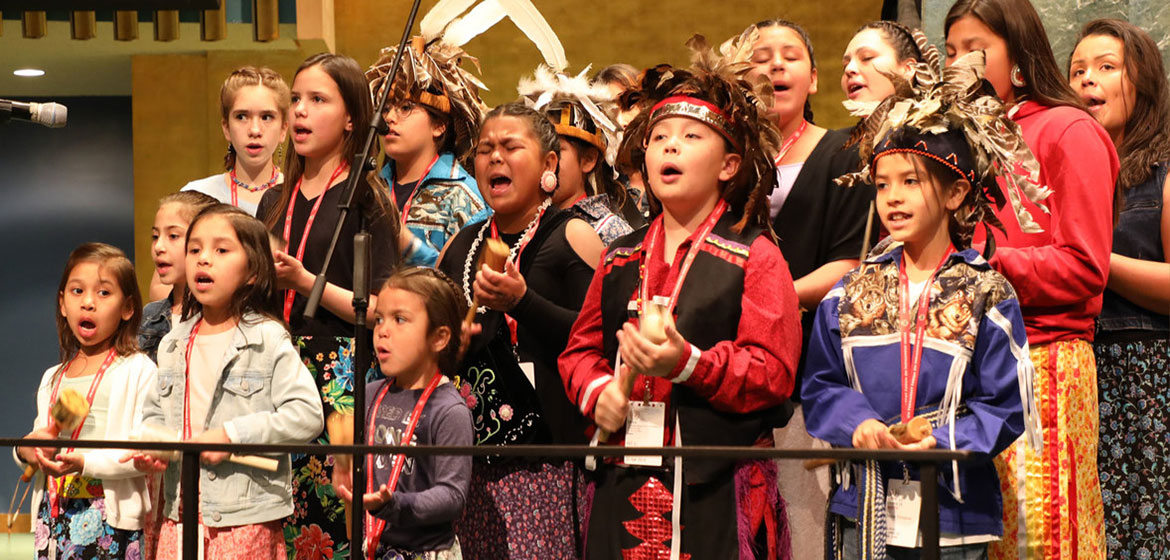UN News/Predrag Vasić
Traditional knowledge is at the core of indigenous identity, culture and heritage around the world, the chair of the said at the annual event’s opening day on Monday, stressing that it “must be protected”.
Anne Nuorgam, who is a member of Finland’s Saami Parliament and head of the Saami Council’s Human Rights Unit, described the Forum as an opportunity to share innovations and practices, developed in indigenous communities “over centuries and millennia”.
Indigenous peoples make up less than six per cent of the world’s population, but account for 15 per cent of the poorest on earth, according to the Forum. They live in some 90 countries, represent 5,000 different cultures and speak the overwhelming majority of the world’s estimated 6,700 languages.
Noting that 2019 is the International Year of Indigenous Languages, she said that “we have to celebrate our languages, but also take concrete action to preserve them and save those on the verge of extinction”.
Ms. Nuorgam pointed out that in many countries, indigenous children are not taught in their language. Citing Article 14 of the UN Declaration on the Rights of Indigenous Peoples () , she recalled that indigenous peoples have the right to provide education in their own languages.
“However, this needs financial and technical support from Member States and the UN System”, she stated.
As studies show that children learn best in their own mother tongue, Ms. Nuorgam encouraged everyone to “make sure our children” are connected to their indigenous communities and cultures, as they are “inextricably linked to their lands, territories and natural resources”.
“This enables us to protect our traditional knowledge”, asserted the chair.
Indigenous issues linked to world development
Recognizing UNDRIP as a "watershed moment" in 2007, Maria Fernanda Espinosa lamented that it still faced implementation challenges, saying that the world has a “historic debt with the indigenous peoples” and that much more must be done to overcome the implementation gap.
She also drew attention to indigenous women, pointing out that while women are key agents of change for tackling poverty and hunger, they face multiple forms of discrimination and violence.
In his opening remarks, Valentin Rybakov, Vice-President of the Economic and Social Council (), explained that the Forum’s expert advice on indigenous peoples’ issues, informs ECOSOC deliberations and decisions.
“This is of particular importance in helping us follow up on the implementation of the ”, said Mr. Rybakov.
He mentioned key activities in support of the (SDGs), including, in September, the first SDG Summit for State heads since the 2030 Agenda was adopted and the UN High-level Political Forum (HLPF) in July to review six of the SDGs, including on quality education, economic growth and combatting climate change.
“These topics are of central importance to indigenous peoples and the attainment of their human rights”, he said, saying that the Permanent Forum and its follow-up activities “demonstrably contributes” to reaching these goals.
“Along with recognition comes the need to acknowledge the source, ownership and protection of traditional knowledge”, Mr. Rybakov said.
Thriving for ‘millennia’
The Executive Secretary of the Convention on biological Diversity, Cristiana Pasca Palma, credited her Romanian grandparents – who used traditional agricultural methods passed down for centuries, to till the soil – for nurturing her appreciation of biodiversity and related traditional knowledge.
“All of our ancestors have always lived off the land and waters in one form or another”, she said. “And their traditional knowledge, often transmitted especially through women – grandmother to mother, to daughter – have enabled us as a species to thrive for millennia”.
The event also enjoyed a performance by Sjisäwishék, or ‘Keeping the fire strong’ - indigenous girls of the Onondaga Nation, Haudenoasuanee Confederacy, and a ceremonial welcome by the traditional Chief of the Onondaga Nation, Tadodaho Sid Hill.
The session runs from 22 April through 3 May, with regional dialogues to be held during the second week.
Established by the UN Economic and Social Council (ECOSOC) in 2000, the Forum provides it with advice and recommendation on indigenous issues. The 16 independent experts of the Forum – eight nominated by UN Member States and others by indigenous organizations globally – work in their personal capacity.
Source:
Related to SDG 10: Reduced inequalities and SDG 4: Quality education



